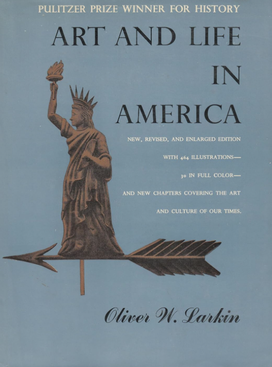
The Pulitzer Prize for History, administered by Columbia University, is one of the seven American Pulitzer Prizes that are annually awarded for Letters, Drama, and Music. It has been presented since 1917 for a distinguished book about the history of the United States. Thus it is one of the original Pulitzers, for the program was inaugurated in 1917 with seven prizes, four of which were awarded that year. The Pulitzer Prize program has also recognized some historical work with its Biography prize, from 1917, and its General Non-Fiction prize, from 1962.

Alan Shaw Taylor is an American historian and scholar who, most recently, was the Thomas Jefferson Memorial Foundation Professor of History at the University of Virginia. A specialist in the early history of the United States, Taylor has written extensively about the colonial history of the United States, the American Revolution, and the early American Republic. Taylor has received two Pulitzer Prizes and the Bancroft Prize, and was also a finalist for the National Book Award for non-fiction. In 2020 he was elected to the American Philosophical Society.

Paul Goldberger is an American author, architecture critic and lecturer — widely known as contributing editor at Vanity Fair, architectural critic for the New York Times (1997-) and columnist of Sky Line for The New Yorker.

The following are the Pulitzer Prizes for 1925.
Frederic Logan Paxson was an American historian. He also served as President of the Mississippi Valley Historical Association. He had undergraduate and PhD degrees from the University of Pennsylvania, as well as a master's from Harvard University. He taught at Wisconsin as successor to Frederick Jackson Turner and the University of California-Berkeley from 1932 to 1947.
Fred Albert Shannon was an American historian. He had many publications related to American history, and he won the 1929 Pulitzer Prize for History for The Organization and Administration of the Union Army, 1861-1865 (1928).
Roy Franklin Nichols was an American historian who won the 1949 Pulitzer Prize for History for The Disruption of American Democracy.
Frederic Lauriston Bullard was an American Christian minister and later an editorialist who won the 1927 Pulitzer Prize for Editorial Writing for his work in the Boston Herald entitled "We Submit", which argued for a retrial in the Sacco and Vanzetti case. He also wrote several books regarding Abraham Lincoln.
Sumner Chilton Powell was an American historian and history teacher at the Choate School, a college-prep boarding school in Wallingford, Connecticut.

Earle L. "Buddy" Bunker was an American photographer for the Omaha World-Herald and one of the two winners of the 1944 Pulitzer Prize for Photography. Bunker won the Pulitzer for his photograph which he titled Homecoming.

Gobind Behari Lal was an Indian-American journalist and independence activist. A relative and close associate of Lala Har Dayal, he joined the Ghadar Party and participated in the Indian independence movement. He arrived the United States on a scholarship to study at the University of California, Berkeley. Later, he worked as a science editor for the Hearst Newspapers. In 1937, he became the first Indian to win the Pulitzer Prize.

Abraham Lincoln: The War Years encompasses volumes three through six of Carl Sandburg's six-volume biography of Abraham Lincoln; these volumes focus particularly on the American Civil War period. The first two volumes, Abraham Lincoln: The Prairie Years, were published in 1926 and cover the period from Lincoln's birth through his inauguration as president. The final four volumes were published together in 1939, and won the 1940 Pulitzer Prize for History.
Gene Swann Graham was an American journalist and educator who was associated for many years with the Nashville Tennessean and with the University of Illinois at Urbana–Champaign. He was a co-winner of the Pulitzer Prize for National Reporting in 1962.

In the Days of McKinley is a nonfiction history book by Margaret Leech published in 1959 by Harper & Brothers Publishers. It won the 1960 Pulitzer Prize for History. It is a biography of the former American President William McKinley.

Art and Life in America is a book by Oliver W. Larkin published in 1949 by Rinehart & Company which won the 1950 Pulitzer Prize for History. It is a book which comprehensively deals about Art and artists in the United States.
The Uprooted: The Epic Story of the Great Migrations That Made the American People is book about European migrations into the United States by Oscar Handlin. It won the Pulitzer Prize for History in 1952.
Minna Lewinson was an American journalist and joint winner of the 1918 Pulitzer Prize for Newspaper History, along with Henry Beetle Hough. She is notable as the first woman to win a journalism Pulitzer Prize and work for the New York Times.
Shirley Christian is a Pulitzer Prize-winning journalist and author, known for reporting on the Central American crisis during the 1970s and 1980s. Christian has worked as a foreign correspondent for the New York Times, Miami Herald, and Associated Press. Her book on the Nicaraguan Revolution, according to the Wall Street Journal, “may stand as the definitive account of the fall of Anastasio Somoza and the rise of the Sandinistas.”
The Road to Reunion, 1865–1900 is a nonfiction history book by Paul Herman Buck. It won the 1938 Pulitzer Prize for History.

The American Revolution: A Constitutional Interpretation is a book by Charles Howard McIlwain. It won the 1924 Pulitzer Prize for History.












